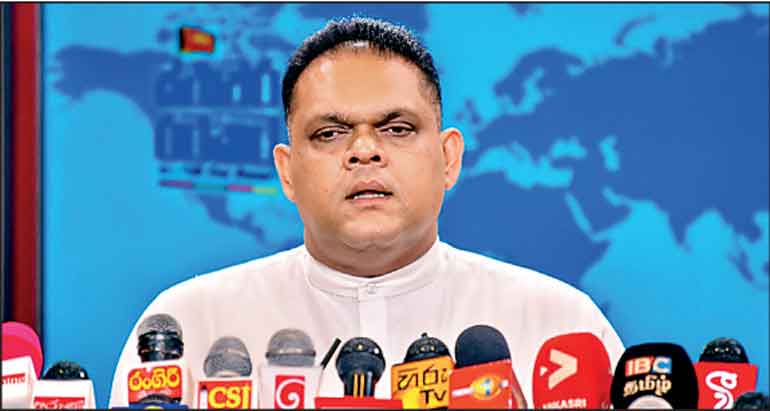Wednesday Feb 25, 2026
Wednesday Feb 25, 2026
Saturday, 1 June 2024 01:18 - - {{hitsCtrl.values.hits}}

State Minister of Finance Shehan Semasinghe
State Minister of Finance Shehan Semasinghe on Thursday expressed optimism that Sri Lanka is on track to finalise external debt negotiations in time for the International Monetary Fund (IMF) to consider the next review of its economic stabilisation program. “We have a strong conviction of finalising within the timelines. We can do it,” Semasinghe stated during a press briefing at the Presidential Media Centre (PMC).
He disclosed that discussions are advancing on converting in-principle agreements with official creditors into Memoranda of Understanding (MOUs). “We have to open the second round of negotiations with bondholders,” he added, noting that advisors for both the bondholders and the Government are actively engaged.
Semasinghe also noted the critical role of the primary balance in the IMF’s economic stabilisation program. “The goal is to shift the primary balance from -3.7% in 2022 to +2.3% by 2025 and maintain it at 2% beyond 2032. Additionally, Government revenue, which stood at 8.3% of GDP in 2022, is targeted to exceed 15% by 2025, ensuring the uninterrupted provision of essential services.”
The State Minister highlighted the reform process’s significant impact on vulnerable populations. “Our goal is to reduce multidimensional poverty to below 15% by 2027 and to 10% by 2035. It is the Government’s responsibility to implement the necessary reforms and programs outlined in the Economic Transformation Bill, and we are committed to fulfilling this mandate without hesitation.”
Semasinghe criticised those opposing the Economic Transformation Bill, claiming they wish to return the country to economic crisis.
He asserted that the Government is focused on a positive economic outlook, while Opposition groups are driven by political motives.
“The Economic Transformation Bill aims to increase productivity, ensure equal opportunities for all citizens, enhance infrastructure, generate job opportunities, foster economic growth and expand the competitive market through innovative exports. However, some individuals, lacking understanding of the Bill, are making various claims,” he charged.
Semasinghe detailed the Bill’s ambitious targets such as reducing the country’s debt burden from 128% of GDP in 2022 to 95% by 2032, decreasing the Government’s gross money supply from 34.6% in 2022 to 13% by 2032 and lowering the foreign debt servicing ratio from 9.6% in 2022 to 4.5% by 2027. “The Bill aims to embed these goals into the country’s legal framework to establish a sustainable economy,” he added.
He said the Bill also sets out to achieve an economic growth rate exceeding 5% after 2027, recovering from a 7.8% decline in 2022. “Unemployment, which was 4.7% in 2022, is expected to be maintained below 5% by 2025. The labour force participation rate for women, which was 32.1% in 2022, is targeted to increase to at least 40% by 2030 and 50% by 2040. The current account balance, at -1.9% in 2022, is aimed to be maintained at 1% by 2025. Exports of goods and services, which were 21% in 2022, are projected to rise to 40% by 2025 and 60% by 2040 through the Economic Transformation Act. Foreign direct investments (FDIs), which was 1.6% in 2022, is expected to reach at least 5% by 2030, with a goal for direct investment to account for 40% of the country’s exports of goods and services by 2030,” he explained.
He affirmed that the Government is committed to pushing through these reforms and achieving sustainable economic growth for Sri Lanka.